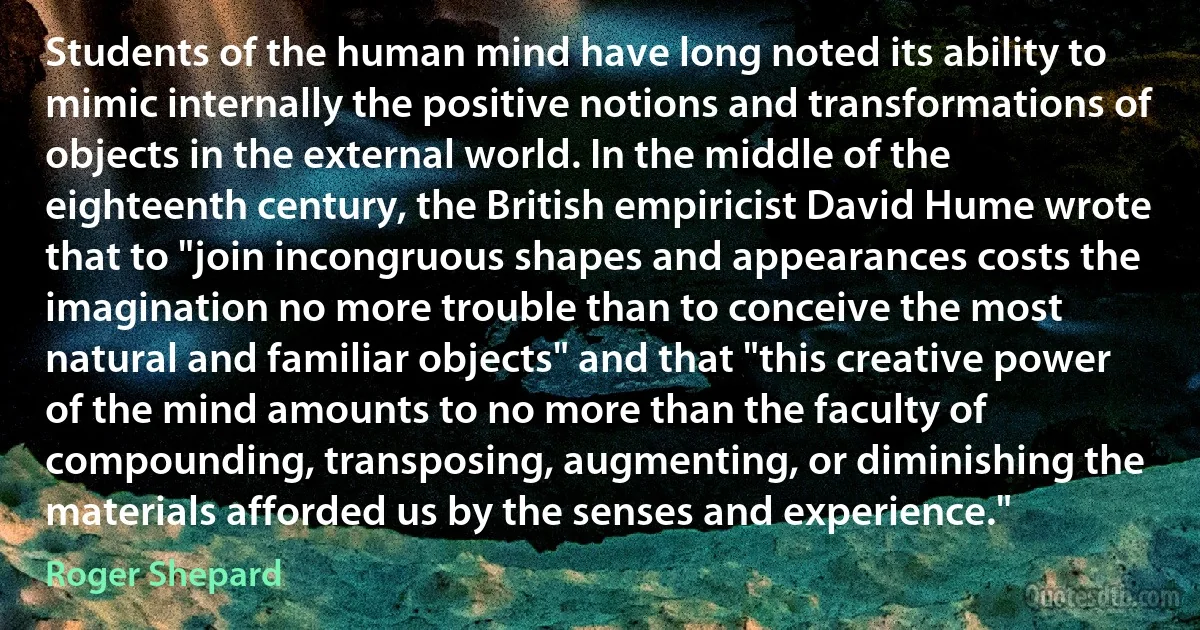
Students of the human mind have long noted its ability to mimic internally the positive notions and transformations of objects in the external world. In the middle of the eighteenth century, the British empiricist David Hume wrote that to "join incongruous shapes and appearances costs the imagination no more trouble than to conceive the most natural and familiar objects" and that "this creative power of the mind amounts to no more than the faculty of compounding, transposing, augmenting, or diminishing the materials afforded us by the senses and experience."
Roger ShepardRelated topics
ability century compounding creative eighteenth empiricist experience faculty human join middle mind natural power trouble world hume costsRelated quotes
The demons start the warfare in the imagination; they cultivate it with thoughts; they defile the nous, they take it down into the heart; and they make both the soul and the body filthy. What decides a person's entire progress or failure is whether he gives in to or resists the attacks of the imagination. If he makes the mistake of beginning a dialogue with the sinful assault and accepting the devil's garbage by his own consent, what will follow are falls of the sould, mind, heart, and body. As a result, the passion will take him captive.

Seraphim Rose
The man who has struggled bravely with the passions of the body, has fought ably against unclean spirits, and has expelled from his soul the conceptual images they provoke, should pray for a pure heart to be given him and for a spirit of integrity to be renewed within him (cf. Ps. 51:10). In other words, he should pray that by grace he may be completely emptied of evil thoughts and filled with divine thoughts, so that he may become a spiritual world of God, splendid and vast, wrought from moral, natural and theological forms of contemplation.

Maximus the Confessor
I'm no historian," said Harry. "But morals are morals. What's unethical here and now is unethical anywhere, anytime."
"Kane, you're wrong. It is ethical to execute a man for theft?"
"Of course."
"Did you know that there was once a vastly detailed science of rehabilitation for criminals? It was a branch of psychology, naturally, but it was by far the largest such branch. By the middle of century twenty-one, nearly two-thirds of all criminals could eventually be released as cured."
"That's silly. Why go to all that trouble when the organ banks must have been crying for - Oh. I see. No organ banks.

Larry Niven
Creativity is not limited to people practising one of the traditional forms of art, and even in the case of artists, creativity is not confined to the exercise of their art. Each one of us has a creative potential, which is hidden by competitiveness and success-aggression. To recognize, explore and develop this potential is the task of the School. Creation – whether it be a painting, sculpture, symphony or novel – involves not merely talent, intuition, powers of imagination and application, but also the ability to shape material that could be expanded to other socially relevant spheres.

Joseph Beuys
Creativity is not limited to people practising one of the traditional forms of art, and even in the case of artists, creativity is not confined to the exercise of their art. Each one of us has a creative potential, which is hidden by competitiveness and success-aggression. To recognize, explore and develop this potential is the task of the School. Creation – whether it be a painting, sculpture, symphony or novel – involves not merely talent, intuition, powers of imagination and application, but also the ability to shape material that could be expanded to other socially relevant spheres.

Heinrich Böll
